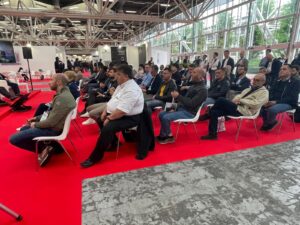During E-Tech Europe 2024, held in Bologna, we were privileged to attend an extraordinary panel moderated by Mauro Andriotto, Adjunct professor of finance at Bocconi University. At the event, Director Giovanni Sapere spoke alongside some of Italy’s most eminent technology experts, exploring how new technologies are redefining the boundaries of industry and commerce.
Below are the speech and responses from the editor of our magazine, Giovanni Sapere:
Moderator: How are new technologies redefining the boundaries of what is possible in industry and commerce?
Director: The exponential acceleration of technological change makes it increasingly difficult to predict when and how frontier technologies will be adopted, while rapid advances bring not only innovation, but also accelerated obsolescence; AR, AI, VR, blockchain and IoT are converging into a single ecosystem, ushering in the era of ‘Technological Human Evolution’, where humanity will embrace integrated solutions such as smart glasses, blurring the boundaries between physical and digital reality and converging towards an augmented reality environment enriched by user-generated content, for a complete fusion of digital and physical capabilities.
Moderator: What are the most promising innovations in robotics, artificial intelligence and automation?
Director: Brain-co interfaces are revolutionising the way we interact with technology, enabling the control of external devices through thought alone. This not only has the potential to drastically improve the lives of disabled people, but also opens up new possibilities for controlling advanced technologies. Furthermore, autonomous and precision robots are finding applications in various sectors, improving efficiency and precision in processes ranging from manufacturing to agriculture.
Moderator: What key challenges need to be overcome to facilitate wider adoption of frontier technologies?
Director: AR, AI, VR, blockchain and IoT are converging into a single ecosystem, ushering in the era of ‘Technological Human Evolution’.” “The challenges are varied and include the need for major infrastructure upgrades to adopt new technologies, as in the case of blockchain integration in banking. In addition, different international regulations, such as GDPR in Europe, place significant limitations on the use of artificial intelligence in terms of privacy and data management. Finally, technology adoption often involves high upfront costs and resistance to change on the part of staff and customers, requiring a considerable commitment to training and awareness.
Moderator: “How are the Internet of Things and advanced data analytics transforming business models and supply chains?
Director: The IoT is revolutionising industrial operations by enabling real-time data collection, which improves predictive maintenance and operational efficiency. This also has significant impacts in supply chains, where advanced analysis of this data enables better demand forecasting and inventory optimisation, customising supply based on customers’ purchasing behaviour.Moderator: What innovations in materials, nanotechnology and biotechnology could revolutionise future products and processes?
Director: Nanotechnology is introducing significant improvements, especially in electronics and medicine, through the development of smaller, more efficient devices and medical treatments at the molecular level. In parallel, advanced biotechnology is transforming sectors such as agriculture and medicine, with plants genetically modified to resist disease and drought and new gene therapies for previously incurable diseases.
Moderator: “How can companies effectively integrate new technologies with existing systems and processes?
Director: ‘Integration requires customised strategies, taking into account company specificities. For example, the introduction of IoT in manufacturing may require significant software upgrades and detailed staff training. In addition, the use of digital platforms that assist the step-by-step adoption of new technologies can facilitate and speed up this process.”
Moderator: What are the ethical and social implications of adopting advanced technologies such as artificial intelligence and robotics?
Director: Automation increases efficiency but may also reduce the number of jobs, raising significant ethical issues related to equity and social inclusion. Furthermore, the intensification of personal data collection through AI and IoT raises concerns about privacy and surveillance, issues that need careful consideration and regulation to ensure that the use of these technologies respects individual rights.
The adoption of frontier technologies represents a momentous shift for industry and commerce, offering extraordinary opportunities but also presenting significant challenges. Our discussion during E-Tech Europe 2024 highlighted how understanding and managing these technological advances will be crucial for future generations

Author: Editorial staff The Patent Magazine